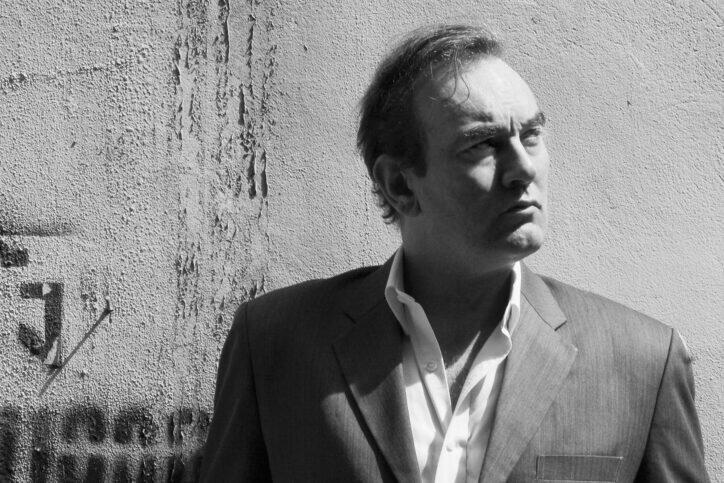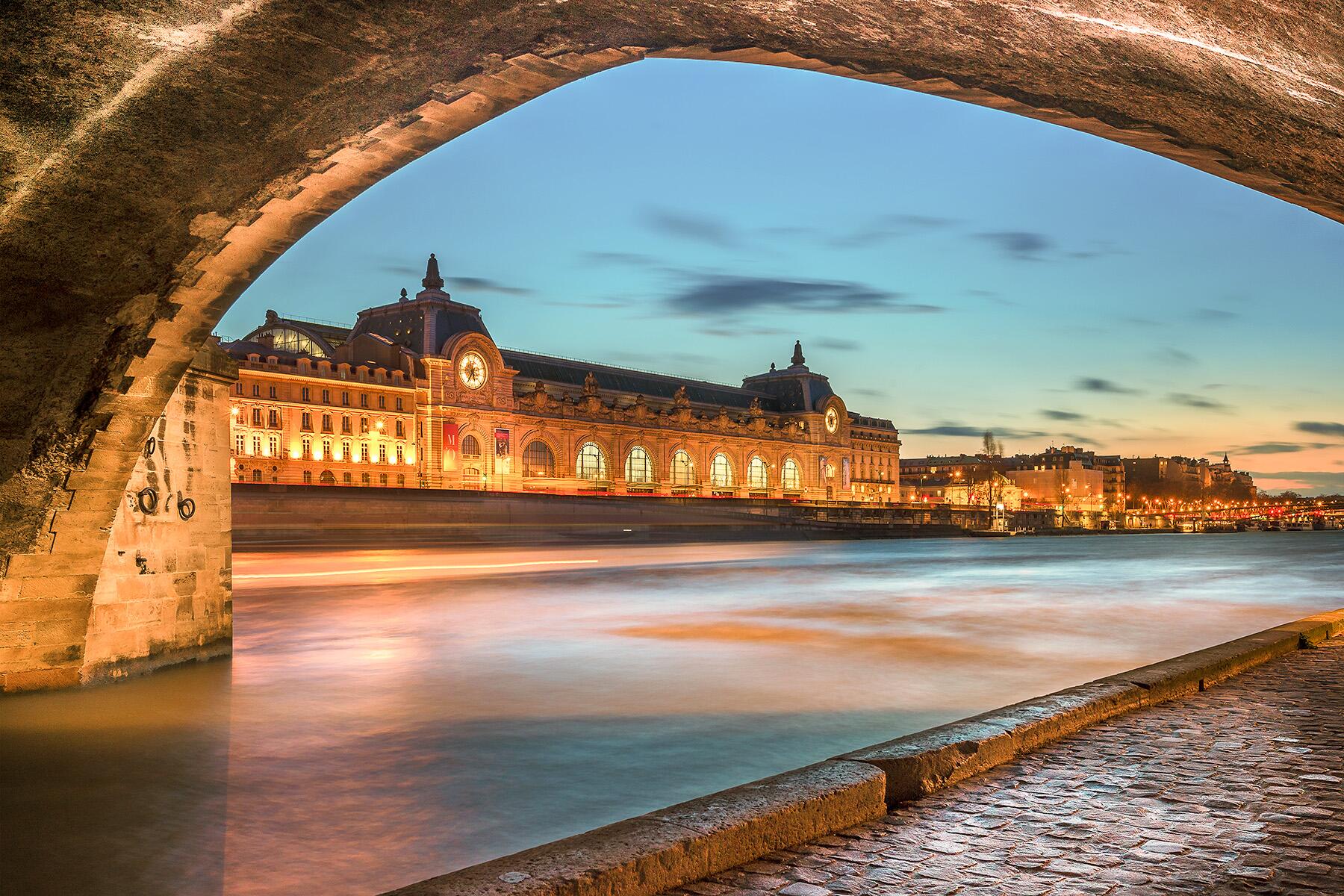He’s been called “the best novelist you’ve never heard of” and the heir to Graham Greene. But with the release of his latest novel, Lawrence Osborne cements his legacy as a master of the 21st-century literary thriller. His new book, "The Glass Kingdom," is set in Bangkok, where Osborne lives.
It’s early in Los Angeles, late in Bangkok, where the novelist Lawrence Osborne lives. His face appears on my screen, frozen at first. He’s sitting in the pixelated gloom of his apartment fidgeting with his computer. He asks, “Can you hear me?” I tell him I can. His audio comes in long, clear waves for minutes at a time, and I can comprehend every syllable spoken in his deep, sonorous English accent—then it all crashes into inarticulate electronic screams, followed by dead silence. Then the cycle repeats. Throughout our interview, his face rarely moves, trapped there in my laptop for long periods of time. When there is movement, one pixelated Lawrence Osborne superimposes over another, as though his soul is trying to flee his body. There are thunderstorms in Bangkok, he tells me, and it’s interfering with his connection.
“I feel like I’m talking to one of the characters in your book,” I say, alluding to his haunting new novel, The Glass Kingdom, which is set in a Bangkok apartment building.
“You are!” he announces and then breaks into surprisingly high-pitched, subtly maniacal laughter.
That’s a terrifying thought—for Osborne, that is. Rarely does anything good happen to a character in one of his novels. In the last eight years, starting with The Forgiven in 2012, the 62-year-old has published six books. They usually depict the experiences of a Westerner, typically American or British, sometimes straight-laced, sometimes a criminal, but always a narcissist, who find themselves in a foreign country, where they inevitably encounter nefarious circumstances and some form of ruination. They are startlingly exquisite literary page-turners, which have won him wide acclaim. The Guardian once (somewhat snarkily) proclaimed he’s “the best writer you’ve never heard of” and he’s constantly heralded as the second coming of Graham Greene, a comparison that seemingly baffles him.
“I thought it was ridiculous and suddenly it’s become this thing,” he says. “And sooner or later I’ll get punished for it. Someone will say, ‘Let’s compare this asshole to the real Graham Greene.’”

The Glass Kingdom, which was published last week, may not be comparable to the works of Greene, but it is decidedly Osbornesque. It tells the tale of Sarah Mullins, an amateur grifter who’s on the lam in Bangkok, holed up in a tony apartment building with a briefcase stuffed full with $250,000 cash, as political uprisings unravel outside and ghosts lurk inside. Like much of Osborne’s work, it’s a novel in two halves, glued together by sublimely subtle prose and grounded realism. The first half is the slow progression of quiet dread, where hubristic strangers mingle with a city they don’t understand. The second is a chaotic symphony where sin and karma ruthlessly collide. The result is a thrilling novel, an eerie march toward a heart-wrenchingly horrifying conclusion.
“The beginning has to be as quiet as I can make it,” he explains. “So that the reader is being talked to in his ear. It’s oral storytelling. Oral storytellers never shout. That’s what calms people down, just like children. Or tales around a bonfire where you have to be quiet to listen. It’s a very old-fashioned way to write novels. But for me it’s the kind of novel I like to read, so by nature it’s the kind of novel I like to write.”
The connection freezes again, distorting his face. The storm lingers. The blustery weather isn’t the only storm brewing in Bangkok right now. COVID-19 has upended Thailand, which has closed its borders to outside tourism and enforced strict lockdowns. Although there have been fewer than 3,500 cases and only 58 deaths, the economy has suffered. Tourism alone accounts for 22% of its GDP and the borders aren’t expected to open again until 2021. The instability has given rise to protests against the military government and against the king, who lives lavishly in Germany on the public dole.
Osborne’s been an eyewitness to Bangkok’s unrest before. He’s lived there since 2012—plus a previous stint in the mid-aughts—and experienced firsthand two military coups, one in ‘06, the other in ‘14. In the latter, he watched from his apartment as a grenade was lobbed at the house of his neighbor, the ex-prime minister, Abhisit Vejjajiva.
“I was just sitting outside with my evening gin and tonic. The glass smashed all around. The shockwave was absolutely surreal.”
“Someone threw a grenade into his front garden,” Osborne says. “And it exploded. I was just sitting outside with my evening gin and tonic. The glass smashed all around. The shockwave was absolutely surreal. Nobody was hurt because nobody was home. But I was home, watching the grenade go over the wall. It was insane. And I just thought, ‘Well, it wasn’t aimed at me.’ But it was close.”
The instability of uprising serves as a critical backdrop to The Glass Kingdom, a danger that prowls outside the walls of the apartment building, the novel’s eponymous Kingdom. The building is cribbed entirely from the one in which Osborne lives—a ‘90s era concrete-and-glass fantasy. It’s a residence tangled in its own mythology, mired in the lore of suicides and ghosts. Not so long ago, an old man killed himself upstairs and his body was removed via the service elevator. Now, according to Osborne’s maid, the old man’s ghost rides the building’s elevator and occasionally exits onto his floor. “Once a week she says, ‘You cannot go out on the landing. A ghost is there.’ I actually obey the rule. I just go, ‘OK, I won’t go,’ because she would be very disappointed in me if I disobeyed her.”
The belief of spirits is so pervasive in Thailand that buildings are torn down to prevent hauntings. “That’s why there are no old houses,” Osborne says. “Everything is obliterated. You can’t even buy antiques here. They’re considered to be haunted.”
After living here for so long, this brand of spiritualism has started to permeate Osborne’s thinking. “It begins to seep into you. Do I believe in ghosts? Well, no, rationally. But when my maid says that I shouldn’t go out to the landing, I don’t. It’s sort of an instinctual reaction. I don’t believe in ghosts. And yet I sort of do. Let’s put it like this: I don’t believe in them, but I don’t disbelieve in them.”
“Once a week she says, ‘You cannot go out on the landing. A ghost is there.’”
Karma, which is something he calls “insidiously ubiquitous” in Thailand, has similarly worked its way into his hesitant ideology. “This idea of return, actions being repaid, of course it’s a superstitious idea. The world can’t work that way. But so often it seems to do just that. One likes to believe that intentionally bad actions don’t just happen and that there are consequences to them. But, of course, that’s an illusion and such things happen all the time.”
Osborne has lived a charmed life. He was raised in the UK, spent much of his childhood in Europe, was educated at Cambridge and Harvard, and found himself stationed all over the world in his former life as a celebrated journalist. His nomadic lifestyle has given him fodder for five books of nonfiction, including the sometimes bawdy, but frequently charming Bangkok Days, about his mid-aughts Thailand tenure. His wanderings have also served as critical elements in his novels, something that somewhat surprises him.
“None of these places were ever places I thought I’d write a book about.” As his WiFi connection struggles, he goes through the catalog of countries he’s called home. Morocco: “I was there in ’86, I lived there for a year. That’s 35 years ago. It’s insane. I never considered writing something set in Morocco.” It became The Forgiven, which is being turned into a movie starring Ralph Fiennes and Jessica Chastain. Greece: “I spent much of my childhood in Greece, so it was a backdrop that’s always been there. No conception of writing a novel set there.” But it birthed Beautiful Animals, which Amazon is currently developing as a film. Mexico: “I worked there as a journalist 30 years ago at the border in El Centro. For 30 years I didn’t use that material. But I have the notebooks. That’s a long time to sit on it. I didn’t really intend to use it.” But from it came Only to Sleep, which is one of the few Osborne novels not undergoing cinematic metamorphosis (Hunters in the Dark and Ballad of a Small Player are both in pre-production).
However, in many ways, it’s Bangkok that’s really assisted him these last eight, prolific years, a period that’s seen him explode onto the literary scene. “It’s a very good city for a writer. A lot of people don’t realize how much better your life can be when you get away from London or New York. These big hedge-fund cities. They’re not made for us. New York’s a rat cage at this point, unless you have family trust-fund money. I was paying four grand [per month in rent in New York] and I was worried about money all the time. I never had any time to write books. It was a disaster.”
“If I diddled a writer out of money, I would go to Bangkok. Where else would you go?”
Now with The Glass Kingdom, he’s finally found a story for his adopted city. Sarah is based on somebody he knows in Bangkok, while her grift—selling the forged letters of a famous novelist who employs her to an unsuspecting collector—is borrowed from something that happened to an unnamed and “reasonably well-known writer.”
“I put those two stories together. If I diddled a writer out of money, I would go to Bangkok. Where else would you go?”
Although the country is a military dictatorship—Osborne speculates it’s a wannabe Singapore—Westerners are largely ignored. They can saunter in, take an apartment with a couple of months’ rent down and no ID, and vanish. “You can disappear in Bangkok pretty easily because it’s a big city. And it’s so free and loose.”
Osborne lives only a few blocks away from the former home of Alexandre Cazes, a 25-year-old French Canadian, who died in a Thai prison in 2017. He’s turning the story into a television series with Working Title. “He made tens of millions of dollars selling a combination of raw milk and assassinations on the dark web. And he had his operation in Bangkok. He was arrested by the FBI,” he says. “They killed him, probably. I don’t think he committed suicide. Thailand’s still a pretty dark place. But it’s not about sex anymore. It’s about the dark web and boiler rooms.”

All those tales of hidden criminality are part of the cacophony outside—the constant storm of swindlers and grifters, traffickers and runaways. But inside, his apartment remains hushed, a different world. “All I hear is jungle sounds. It’s lovely. I don’t even hear cars here. All I hear are tree frogs.” Yet, he admits, even the soothing jungle noises are deeply ominous.
“During the early part of COVID,” he says, “the power was going out every two days. And it would go out for a day, a night, and a day. I would just move to a hotel because I couldn’t deal with it. When I’d go back, there were a lot of reptiles and dogs [in the building]. An immediate invasion. If the power were off for a week in this building, it would just be reclaimed.” The horror of this reality stills my heart. This theme of reclamation features heavily in The Glass Kingdom’s breathless, mesmerizing final act.
Though my mind turns to his potential calamity, Lawrence Osborne gives it no such thought. He focuses on the peacefulness of his surroundings, which continues to inspire a rapid pace of publishing. He’s got another book slated for release next year, On Java Road, which is set in Hong Kong, and he’s working on a book of short stories. He figures in the autumn, he’ll begin writing another novel—his eighth in nine years. But, for now, he sits in the stillness of his kingdom, largely confined by COVID-19, a jungle soundtrack humming outside, ghosts wandering inside. The thunderstorm continues, the connection flickers for a final, lasting time. He fades away into whatever lurks in his night.



